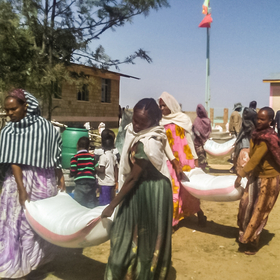Natural and man-made disasters have always accompanied the countries of the Horn of Africa. Volcanic eruptions, drought, floods and locust plagues can appear simultaneously in different places. The floods in turn cause epidemics such as cholera and other contagious diseases. The desert locust is considered the most dangerous of the locust species and is the main cause of food insecurity in the arid and semi-arid areas between West Africa and India - some 16 million square kilometres in 20 countries.
Since the beginning of the year, a plague of locusts of this kind has also been infesting East Africa and thus, also, the eastern and northern regions of Ethiopia. The farmers and inhabitants of the villages tried to chase the locusts away by making noise, smoking and spraying a solution of garlic and herbs. This enabled them to save some of the crops and pasture plants. Nevertheless, the swarms have devoured many fields of cereals, pasture and even bushes and trees. In Hawzien as in the other highland areas of the country, the rainy months are between June and September. This year, the rainfall was above average, and all the cultivated fields were in fine fettle, giving hope for a good yield. But then there was another locust infestation: swarms of locusts that hatched on the other side of the Red Sea reached the Afar and Somali region of Ethiopia in a few days.
On 15 October 2020, numerous swarms also reached Hawzien and its surroundings and ate the lush, burgeoning crops. The people mobilised and tried to defend their fields with all available means. With the help of whistles, trumpets, drums, empty canisters and firecrackers they tried to scare the insects so that they would not settle in the fields. Some also burned rubber, resins, incense and other plant substances to produce a more unpleasant smoke for the insects. These measures can be effective but given the number of swarms and their different locations, many helpers are needed. In addition, favourable wind conditions are needed. It is an arduous battle against the unequal power of billions of soaring, hungry insects. The UN Food and Agriculture Organization states: "A swarm of locusts can consume the same amount of food as about 35,000 people in one day".
The months of November and December are the time for harvesting, but some farmers are trying to harvest their grain fields early, hoping, hoping, that the grain is ripe enough, or at least enough to feed their animals.
In addition to the locust plague, the first case of Covid 19 in Ethiopia was announced in mid-April 2020 and 29 people tested positive a few days later. To slow down the spread, the government ordered hygiene measures, such as frequent hand washing, wearing a mouth-and-nose cover and keeping a distance. This is very difficult for the people in Hawzien to implement. People live side by side with each other; social interactions at the market, in church, and at other social events are important parts of life. There are over 100,000 people living in the Hawzien district - only a few of them have access to running water. Over 80 percent of the population is directly connected to agricultural activities and the remaining 20 percent earn their living from trade, small-scale handcrafts and other services. The people grow various cereals such as barley, wheat, millet, sorghum, peas, chickpeas, beans, linseed and other vegetables and fruits. Every Wednesday is an eventful market day in Hawzien, when over 20,000 people gather to do their business. In fact, most of the people of Hawzien depend on the weekly market for their livelihoods. But, as part of the preventive measures to contain the Corona pandemic, the market was banned. As a result, the population's ability to earn their own living has been severely restricted and they are currently dependent on food donations.
Thanks to the Freunde der Erziehungskunst in Berlin and other donors and helpers, our pupils and the people in the school's neighbourhood (about 500 families in total), have been provided with food in four phases through to September.
The infection rate with Covid-19 continues to rise. So far, over 90,000 people have tested positive throughout the country, 46,638 people have been cured and 1,371 have died. In Hawzien, about 20 people have tested positive and one person has died. Despite the few cases directly in Hawzien, the situation remains tense. People are afraid of being infected with Covid-19, because in this part of the world, people are already dying of diseases that could be easily treated with antibiotics. Yet, there is a lack of the simplest medical facilities. Before the planned school opening at the end of October, many parents were worried that school attendance could endanger the health of the children. And so, the people of Hawzien continue to fight against two natural disasters at the same time.
Atsbaha Gebre-Selassie

